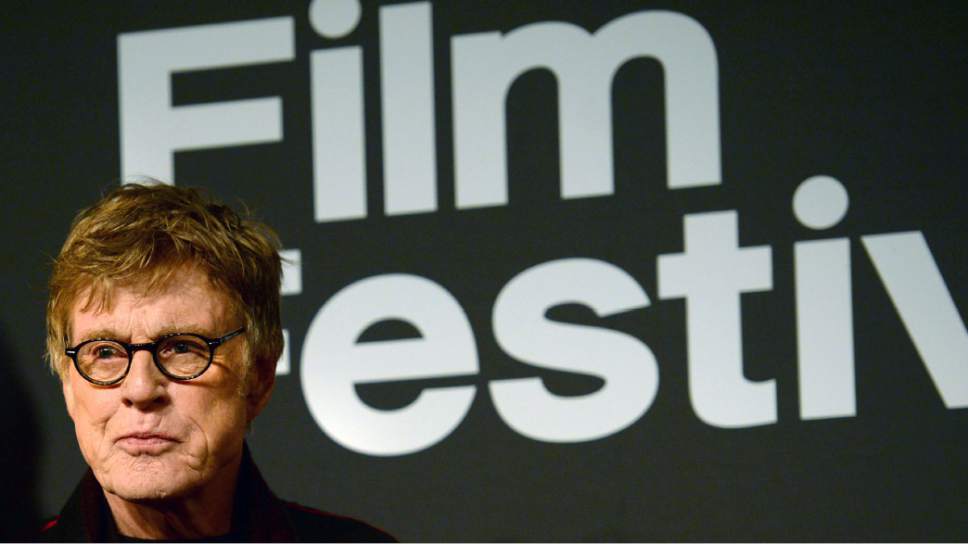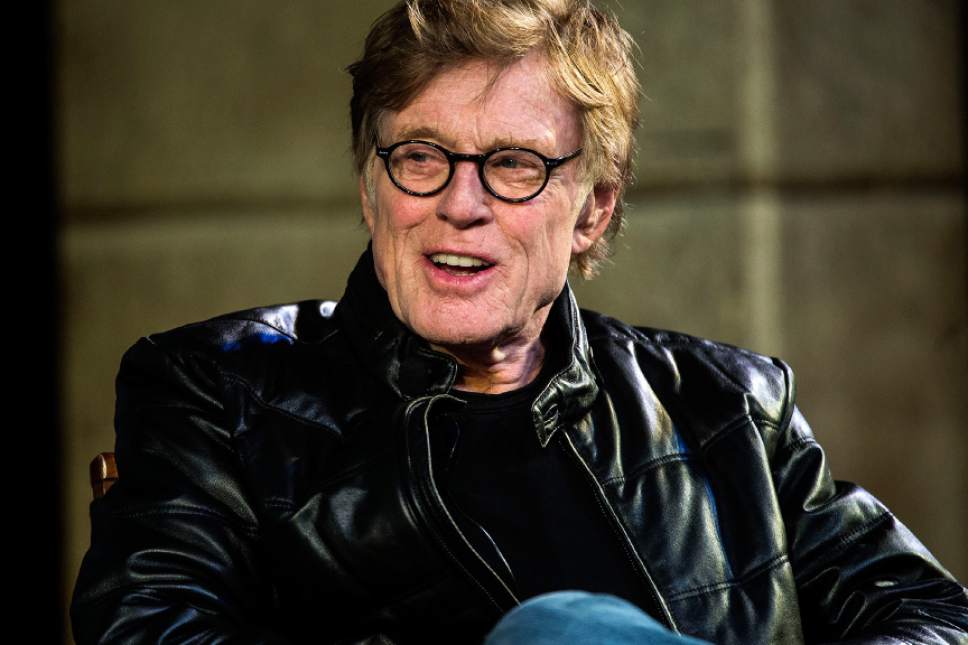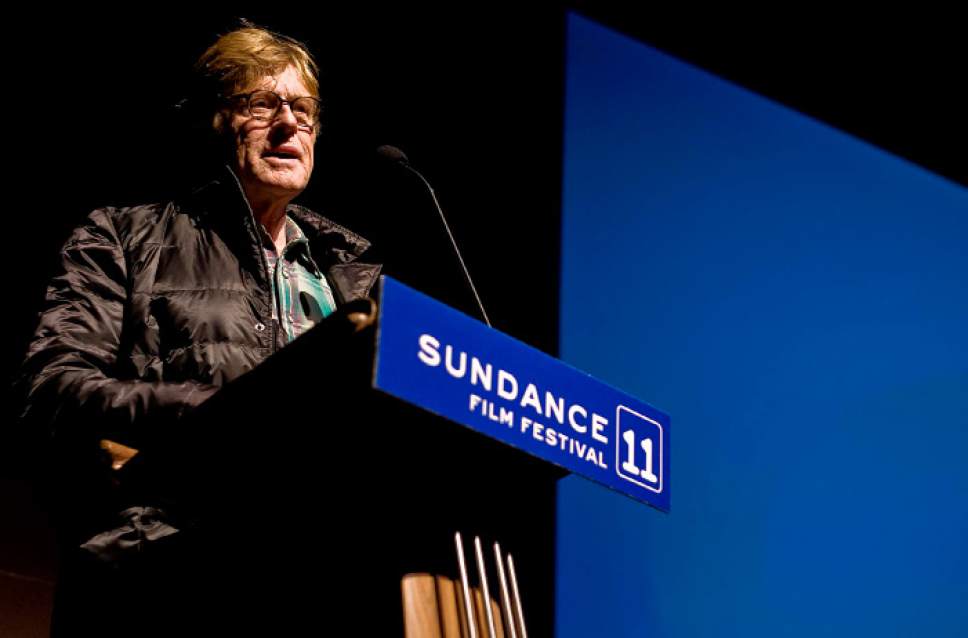This is an archived article that was published on sltrib.com in 2017, and information in the article may be outdated. It is provided only for personal research purposes and may not be reprinted.
In the final weeks of Barack Obama's presidency, with Donald Trump's inauguration approaching, Robert Redford cast his thoughts back to May 2016, when the 44th president invited the actor to the White House.
Obama is a fan — someone, Redford said, who can quote lines from "Three Days of the Condor" and other movies. Most fans, though, don't have the pull to summon their movie idols to the Oval Office.
After talking for nearly an hour, Redford asked a question of the president: "Is there anything you want from me?"
"He said, 'Yes, there is. … Look, I'll be leaving office soon, and I have two daughters, and I'm very concerned about their future, which means the future of young people. And I think the environment is such an important issue that's being ignored.' "
Obama concluded by asking Redford to join forces. "He said, 'After the dust settles, I would like to move forward and spend some attention on the environment and young people, and I would like your help.' "
Redford's Sundance Film Festival, which starts Thursday night — the last night of Obama's presidency — is working along the same lines. The festival's 2017 edition will kick off a new initiative to focus attention on global climate change.
This initiative, The New Climate, will feature documentaries on the topic, and panel discussions with experts and advocates. The first movie the festival will screen, Thursday at Park City's Eccles Center, is "An Inconvenient Sequel: Truth to Power." It's the follow-up to "An Inconvenient Truth," the landmark 2006 documentary in which former Vice President Al Gore presented the case that human-caused climate change is real and getting exponentially worse.
Gore, a friend of Redford's, will be present for Thursday's premiere and a panel discussion the following Sunday.
Climate change, Redford said, "is an issue that should not be polarized through politics. It's an issue that I think should be above politics, because it involves everybody. It involves both sides of the aisle, and to polarize it and divide up is demeaning and debilitating."
Redford also aims to keep Sundance out of the political fray. "We can't advocate, but we can show," he said. "We just let the subject come up through the films. … I've been very careful over the years to not take a position politically, with the festival or the [filmmakers'] labs."
Whether Redford likes it or not, politics and art will be intertwined at this year's festival — and not just because Sundance gets rolling as Trump's administration does.
Many political issues — the environment, the war in Syria, police violence, even the Trump campaign itself — will play out on the screens of Sundance and its upstart rival, the Slamdance Film Festival (whose opening-night film Friday is the water-pollution documentary "What Lies Upstream").
Some political action will spill out onto on the Park City streets. The Women's March on Main, an anti-Trump protest tied to the Women's March on Washington and related events in cities nationwide Saturday, is expected to draw hundreds of people. It will have Sundance star power, with comedian and talk-show host Chelsea Handler signed on as the rally's emcee.
One of the filmmakers who checked "going" on the march's Facebook page is Donna Deitch, who directed the pioneering 1986 lesbian romantic drama "Desert Hearts" (which will screen in a restored print at Park City's Egyptian Theatre on Jan. 24).
"This is a truth-telling moment," Deitch said. "For this many people — men and women and probably a lot of kids — who get out there and march, what they're doing is basically truth-telling."
She cites the old feminist mantra "the personal is political," which she thinks will make a comeback in the age of Trump.
"Now, because we're in a very low time in American politics, that phrase 'the personal is political' is back again, and now applicable to the whole culture," Deitch said this week. "Artists are going to be more motivated than ever before, because there's a real obstruction to justice and humanity in this orange-haired monster."
Another filmmaker planning to march is TV producer and writer Marti Noxon, a longtime show runner on "Buffy the Vampire Slayer" and creator of Bravo's "Girlfriend's Guide to Divorce." Noxon makes her feature directing debut at Sundance with the anorexia drama "To the Bone."
"Does what we do have any real value? Yes, it has value, but if it doesn't translate into action, it's kind of meaningless," she said. "If something like 'Moonlight' helps someone who doesn't have empathy for what it's like to grow up a gay kid in an urban community, maybe once they have that greater understanding, they'll be less likely to judge and less likely to have a hard heart to some of these issues. But if they don't do anything about it, what is it worth?"
Documentary filmmaker Stanley Nelson, who has made several films about African-American history that have debuted at Sundance, urges all artists to speak out.
"We were slapped awake by what just happened in this country," said Nelson, who will premiere his newest documentary, "Tell Them We Are Rising: The Story of Black Colleges and Universities." Nelson also has been immersed in memories of Obama; while finishing the college documentary, he is also completing a retrospective on the Obama presidency that will air Thursday night on BET.
"We have to speak up, we have to speak out. We have to do that in any forum that we're given, whether that's in our films, from the stage when we're introducing our films, or whether it's on the elevator," Nelson said. "Somehow, we all have to take responsibility for what just happened, because I don't think it's what the country feels or what the country believes."
He fears more artists will self-censor to avoid raising controversy or prompting boycotts. "There's already this feeling that we have to cut back on what we say, we've got to keep our heads down, and maybe we won't be noticed and maybe our funding won't be cut," he said.
Jonathan Milott said he and co-director Cary Murnion didn't want to be overtly political when they made their movie, the action drama "Bushwick."
Playing in Sundance's Midnight section, "Bushwick" was sparked by an offhand political comment a few years ago, when then-Texas Gov. Rick Perry joked about the Lone Star State seceding from the United States.
"We thought, 'What if it really happened? What would be the steps that it would take to actually make that come true?' " Murnion said.
"Bushwick" tells the story of Lucy (Brittany Snow), who's trying to get to her grandma in Brooklyn. Lucy gets caught in the middle of an invasion by a post-secession Texas militia, an early salvo of a new civil war.
When they were filming "Bushwick" in late 2015, Murnion said, "the Trump stuff was still kind of a joke. [We thought], 'He's not going to win, it's no big deal.' " But other events, like urban unrest in Baltimore and Ferguson, Mo., made the idea of people in military gear on American streets more plausible, he said.
A week before filming, Murnion and Milott saw the news from Paris — the Nov. 13, 2015, terrorist attack on nightclubs and restaurants. The black-clad soldiers on Paris streets looked similar to how the directors envisioned their fictional Texas troops.
"It was a weird blending of reality and fiction," Milott said.
"Bushwick" doesn't push an obvious political message, he said, because it doesn't have to.
"We don't necessarily need to say that there's red states and blue states, and that the country's divided," he said. "It's less about debating that fact, or debating the rights and wrongs of either side, but questioning how far does either side want to take it. That question of: Is this the road we really want to go down? Do we really want to tear the country apart to this extent?"
It's impossible to completely separate art from politics, said Annie Roney, founder and CEO of Ro*co Films, a distribution company that specializes in documentaries.
"Art is always political in some way," she said. "It's a reflection of someone's experience of being in the world. It's created because that artist has something to say."
Roney's company often distributes movies that deal with hot-button political topics, and shapes distribution plans both to make money and to influence the debate.
She cited the example of Dawn Porter's documentary "Trapped," which premiered at Sundance last year. Porter took her cameras into abortion clinics in the Deep South to show how laws designed to regulate such clinics out of business — called TRAP laws, for Targeted Regulation of Abortion Providers — were working at the ground level.
Porter's team learned the movie had been accepted to Sundance in fall 2015, around the time the U.S. Supreme Court announced it would hear a Texas case to determine whether TRAP laws were constitutional. The court was likely to rule by June, so "there was no time to waste to go to Sundance to look for a distribution deal," Roney said.
Roney got companies to work together with a plan: Take advantage of the publicity generated at Sundance, launch a theatrical run in March 2016 while simultaneously screening for community groups and college campuses in cities where the theatrical run didn't reach. (Community and campus screenings don't usually overlap with the theatrical release.) "Trapped" was in theaters around the time the high court heard arguments in the Texas case last March, and aired on public television in June, just before the court handed down its ruling that the Texas restrictions were unconstitutional.
"It was all very thoughtfully planned out, with the hope that it would affect the outcome," Roney said. "We believe it raised the issue in a meaningful way to communities that maybe weren't aware of what was happening."
Artists, such as filmmakers and actors, are usually faced with two criticisms: that artists should keep their political opinions to themselves and just entertain the audiences (the "shut up and sing" argument), and that artists are preaching to the choir, never piercing the bubble of like-minded fans.
Roney, the documentary distributor, said "there's great value to keeping the choir singing. That, in and of itself, is a good pursuit for these films."
She has seen how movies can affect audiences far outside the media bubble. Her company backed "The Hunting Ground," Kirby Dick's exposé of sexual assault on U.S. college campuses. The film, Roney said, energized activists at colleges nationwide and led many schools to broach the topic during freshman orientation. When Ro*co sold the film in foreign markets, such as France and Australia, she said it sparked discussions about the problem at colleges in those countries.
Redford said he believes art and artists are "essential to any society. Without art, I think society would be in some form of collapse."
"Art is about telling stories, and you tell stories about what is," Redford said. "It is not only enhancing the story of a society, it critiques society at the same time. I think it's incredibly valuable, that art enhances society, it draws attention to society, and it critiques society that's going off the rails."
Twitter: @moviecricket —
How to Sundance
When • Thursday to Jan. 29
Where • Park City and venues in Salt Lake City and the Sundance resort in Provo Canyon.
Passes and ticket packages • On sale at sundance.org/festivals. Many are sold out, but some are still available.
Individual tickets • Tickets are $25 for the first half of the festival in Park City (Jan. 19-24), $20 for Salt Lake City screenings and for the second half in Park City (Jan. 25-29).
Information • sundance.org/festivals







